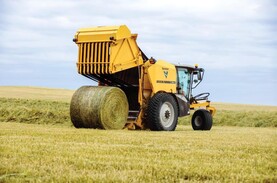Ireland's tillage sector is not getting a fair crack of the whip when it comes to negotiations on schemes, EU policy and at Government level, tillage farmer Ollie Whyte has said.
Speaking at an Irish Grain Growers Group meeting of over 100 tillage farmers in Gormanston, Co Meath, on Monday night, Whyte said that growers only “have to look at the last three CAP schemes that there is strong evidence to back that up”.
Whyte, of Whyte Brothers Farms in Naul, Co Dublin, joined the group over two years ago and said that it is vitally important that the mindset is changed when it comes to the tillage sector.
Looking forward
“If we look at 2022, for most growers it was probably the best year we can ever remember. We’re looking forward to 2023 and it’s a different thing.
"We have a new CAP and the Climate Action Plan and the pesticides directive. All these are bringing a minefield of rules and regulations for everyone here in this room and it’s going to cause serious headaches for the whole lot of us.
“Teagasc data shows that tillage has the lowest greenhouse gas emissions and ammonia emissions of any agricultural sector by a country mile.
"Tillage is possibly the only mainstream agri sector that is close to meeting the targets of 2050 for agriculture in a whole. That’s 27 years before the target and that hasn’t been highlighted,” he said.
CAP
The Dublin farmer said that there is now a situation where the agricultural sector that has the best credentials on climate change is possibly the hardest hit sector in the new CAP deal.
“Most people in this room will be hit with a loss of 25% to 30% on their single farm payment in future and there’ll be very little chance to recover that in full.
“We as a group have decided we cannot concede that and we’re going to challenge the powers that be on that issue. That means maybe a new scheme for tillage farmers to recoup some of that money,” he said.
Premium
He said Irish grain is produced under the strictest rules, but that Ireland’s “opposition in the market place comes on boats from countries that have no regulation whatsoever compared to what we have”.
“We have to get recognition for that and a premium for that and, in turn, added value for that,” he said.
Invasion of solar
Whyte added that in the northeast of the country, there has been an invasion of solar farms in areas which were historically tillage areas.
“Growers that have rented and leased land as their farmed area are being pushed out and that’s going to have a knock-on effect on the price of land. It shouldn’t be let go as it is.
"There’s plenty of marginal land in the country that could site these solar farms and let us keep producing what we’re producing,” he said.
For more coverage of the meeting, see this week’s Irish Farmers Journal.






 This is a subscriber-only article
This is a subscriber-only article











SHARING OPTIONS: